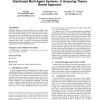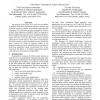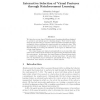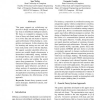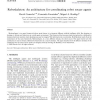1225 search results - page 196 / 245 » Design Principles for Intelligent Environments |
125
click to vote
ATAL
2005
Springer
15 years 7 months ago
2005
Springer
Distributed Multi-Agent Systems (DMAS) such as supply chains functioning in highly dynamic environments need to achieve maximum overall utility during operation. The utility from ...
104
click to vote
ATAL
2004
Springer
15 years 7 months ago
2004
Springer
The purpose of this paper is to report on experiments in (human) multi-issue negotiation and their analysis, and to present a generic software environment supporting such an analy...
137
click to vote
SGAI
2004
Springer
15 years 7 months ago
2004
Springer
We introduce a new class of Reinforcement Learning algorithms designed to operate in perceptual spaces containing images. They work by classifying the percepts using a computer vi...
137
click to vote
EUSFLAT
2003
15 years 3 months ago
2003
This paper suggests an evolutionary approach to design coordination strategies, a key issue in distributed intelligent systems. We focus on competitive strategies in the form of f...
113
Voted
EAAI
2006
15 years 2 months ago
2006
SkeletonAgent is an agent framework whose main feature is to integrate different artificial intelligent skills, like planning or learning, to obtain new behaviours in a multi-agen...
